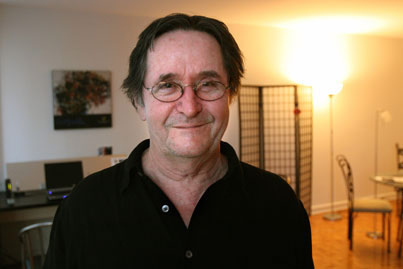Professor hopes to link goose bumps, personality
Professor hopes to link goose bumps, personality McGill University
User Tools (skip):
Professor hopes to link goose bumps, personality

Brian Little wants to know if goose bumps signal something other than cold or fear.
There are as many different teaching styles as there are classrooms in this place. But Brian Little, who is teaching an introductory personality psychology course this spring, is enthrallingly, unmistakably musical in the pace and style of his lectures. He has a booming voice that is strong enough to carry to the back of the Stewart Biology Building lecture hall without a microphone. He has an innate sense of timing, a supply of great material and what Professor Little (who, growing up in Victoria, wanted to become a symphony conductor) calls his lecture trademark “dance between whimsy and gravitas.”
On a recent Wednesday morning, Professor Little illustrated how personality psychology affects health by demonstrating how Type A personalities are prone to suffer from coronary disease. He explained a PowerPoint slide with a snippet of song, then introduced his next point in a stage whisper, before he turned quiet and then off he went anew, hands flying, then shoulders slack and arms by his side, followed by a dramatic statement about death (the 315 students drop-of-a-pin quiet) after which he winked to signal, yes, he knew that he’d just said something over-the-top serious. A crescendo of student laughter filled the room, which suddenly felt intimate and cozy despite its size and hundreds of occupants.
A Distinguished Research Professor Emeritus at Carleton University, from where he retired in 2000, Professor Little came to McGill from Harvard, where he was a Fellow at the Radcliffe Institute for Advanced Study and taught in the Psychology Department. Each of his three years at Harvard, students of the graduating class voted him a favourite professor (the latter coming as no surprise to his McGill students).
His work focuses on, among other things, the benefits and risks of acting out of character. He developed the concept of “personal projects” as a means of understanding people—and turned on its head the conventional understanding of personality. Though we are born either extrovert or introvert, our personal projects move us out of character, Professor Little believes. Indeed, he posits, personal projects routinely compel us to act against our nature and thus seem what we are not.
Introvert or extrovert?
He offers, as an example, himself. He insists he’s an introvert who has performed since he was old enough to stand (as a little boy he was an accomplished soprano) and now is performing in a different fashion in front of hundreds Monday, Wednesday and Friday mornings from 10:30 to 11:25. He is an introvert, he promises, hands emphatically gesturing. “Really.” Dramatic pause. “I am.” Big extroverted smile. “I’m an introvert,” he repeats, “but I will act out of character to teach. Some times in life we say, ‘I will act out of character to be in relationship with you.’ So it may look like this person is an extrovert but they’re really an introvert. The way to find out is by examining their personal projects.”
With the help of his McGill students, Professor Little is mapping the connection between personal projects and goose bumps, also known as aesthetic chills or piloerections. Apparently, half of the population gets goose bumps. “So far I can’t detect many gender differences.”
“At this point we are simply using questionnaires to solicit students’ experiences and so far we are finding that McGill students are experiencing high levels of aesthetic chills—far higher than current research literature would suggest. Next, we will look at the specific experiences that elicit positive chills and eventually try to tie that into what is known in the neuroscience domain, much of which is going on in various departments at McGill.”
Before he began his lecture on personal psychology’s applications to health, his students discussed goose bumps. “They’re a floating theme in this class,” said Sara Mattigetz, U1 Psychology. “They’re important, somehow. It’s a physical reaction to something emotional.”
“It’s not like when you’re cold,” explained Tal Zelinger, U1 psychology.
“It’s not a fear response either,” said Mattigetz.
“I get them in this class a lot, when he mentions something that I’ve wondered about a while,” Zelinger said.
“It’s a reactive kind of moment,” added Tanya Marks, U1 Psychology.
Other students streamed in. The impromptu discussion group continued, taking a different turn, to the self-proclaimed introvert who was about to address hundreds of people.
“I wonder how many hours he spends emailing us each night,” Mattigetz mused.
“I love how he connects with you, with each of us,” Zelinger smiled.
“His enthusiasm gives me chills,” Mattigetz said.
“Totally,” agreed Zelinger.
Are chills the same as goose bumps? Those students are helping Brian Little find out.

